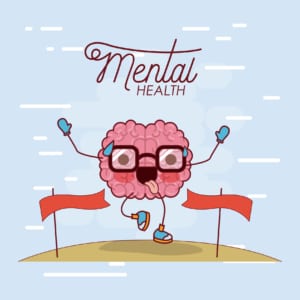Exercise to beat the blues!
 It’s well known that regular exercise brings huge benefits. In a society where sitting has become the norm, being active helps to regulate weight, build and maintain strong muscles and bones, boost energy and promote healthy sleep. It can also reduce the risk of injury and chronic diseases such as heart disease, diabetes, some cancers and osteoporosis. It can also protect memory and thinking skills. But did you know that physical activity can help stave off depression too?
It’s well known that regular exercise brings huge benefits. In a society where sitting has become the norm, being active helps to regulate weight, build and maintain strong muscles and bones, boost energy and promote healthy sleep. It can also reduce the risk of injury and chronic diseases such as heart disease, diabetes, some cancers and osteoporosis. It can also protect memory and thinking skills. But did you know that physical activity can help stave off depression too?
Backed up by research
Recent research among 200,000 people by King’s College London showed that regular exercisers are 16% less likely to develop the blues. This rises to 31% if you follow the Government’s advice and opt for 150 minutes’ physical activity a week – that’s just 20 minutes per day. Interestingly, the results applied across all age groups, from children to pensioners.
The reason? Exercise of any type or intensity brings about changes in areas of the brain that regulate stress and anxiety, allowing you to relax and enjoy life more.
This is partly thanks to the increased production of endorphins, (‘feel-good’ chemicals). These are known to help produce positive feelings and reduce one’s perception of pain.
So the message is get moving, whatever your age, state of fitness, experience or ability. It’s never too late and there are many forms of exercise to choose from, either alone or as part of a group – from gardening, walking or dancing to joining a gym or aerobics class and so on. The better your preferred activity fits in with your lifestyle, the more likely it is that you will remain motivated and keep it up.
Staying safe
If you’re starting out or a bit rusty, here’s how to exercise safely to minimise the risk of injury:
- Seek advice from your GP, osteopath, gym instructor or personal trainer. He or she will assess your current fitness levels and put together a personalised training programme if appropriate.
- Always warm up and stretch muscles before exercising and cool down/stretch properly afterwards.
- Rest for a day between exercise sessions to prevent overuse and enable the body to repair itself.
- When starting a new exercise programme, expect a little post-exercise aching and soreness. This should ease within a couple of days but if not or is very painful, rest, use ice (wrapped in a wet towel for 5 minutes and remove for 10 minutes, repeating twice more) and anti-inflammatory gel to help relieve symptoms.
- Never train if injured or experiencing discomfort.
- If you experience acute pain or any post-exercise discomfort continues beyond a day or so, book an appointment with osteopath Robin Kiashek to check you over.




